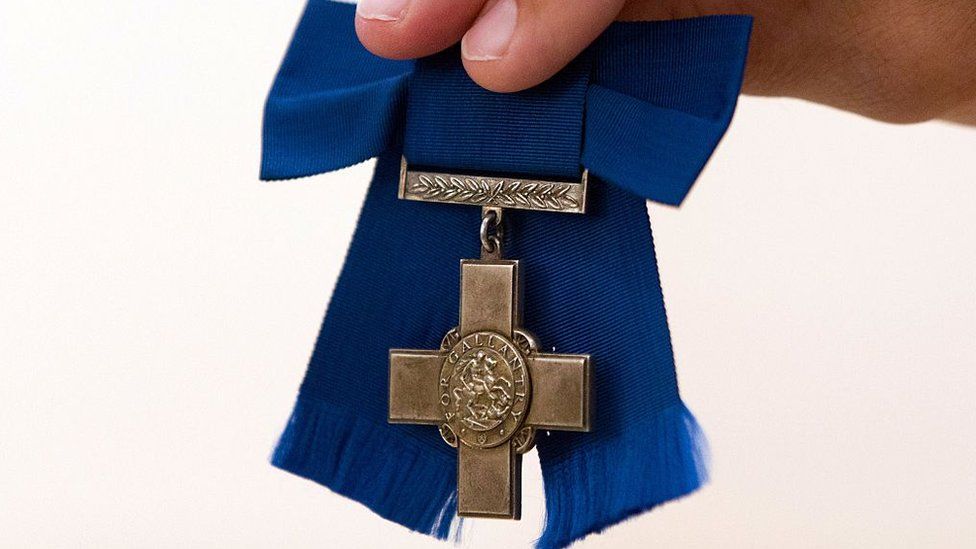The Queen has awarded the George Cross to the NHS as the health service marks its 73rd anniversary on Monday.
In a personal message, the Queen said NHS staff across the UK had worked “with courage, compassion and dedication” for more than 70 years.
NHS England chief executive Sir Simon Stevens said the award recognised the “skill and fortitude” of staff.
The Duke and Duchess of Cambridge are hosting a Buckingham Palace tea later to thank NHS workers.
The George Cross, instituted by King George VI in 1940 during the height of the Blitz in World War Two, is awarded for “acts of the greatest heroism or of the most courage in circumstances of extreme danger”.
In her handwritten message, the Queen wrote: “It is with great pleasure, on behalf of a grateful nation, that I award the George Cross to the National Health Services of the United Kingdom.
“This award recognises all NHS staff, past and present, across all disciplines and all four nations.
“Collectively, over more than seven decades, they have supported the people of our country with courage, compassion and dedication, demonstrating the highest standards of public service.
“You have the enduring thanks and heartfelt appreciation of us all.”

The awarding of the George Cross by the Queen is made on the advice of the George Cross Committee and the prime minister.
This latest award is only the third time the George Cross has been given to a collective body, country or organisation, rather than an individual.
In 1942, the George Cross was conferred on Malta by George VI, in recognition of the heroism displayed by the island’s inhabitants during enemy bombardments in World War Two and in 1999, the Queen awarded the George Cross to the Royal Ulster Constabulary in Northern Ireland, in recognition of the force’s bravery.
Sir Simon said the “unprecedented” award recognised the “skill, compassion and fortitude” of NHS staff, who had responded to “the worst pandemic in a century and the greatest challenge this country has faced since World War Two”.
He added that completing the Covid vaccine rollout – now in its final stages – was “the surest way out of this pandemic” and provided “a sense of hope”.
Dr Chaand Nagpaul, council chairman of the British Medical Association (BMA) which represents doctors, said the award would be “a welcome recognition for many who feel exhausted – physically and mentally – after the gruelling challenge of the last year”.
But he added: “It is also vital to ensure that healthcare professionals work in an environment where there is an adequate workforce and resources, including enough hospitals beds and facilities in general practice.
“This will be vital if we are to be able to tackle the enormous backlog of over five million patients waiting for treatment as a result of the pandemic”. It comes days after Dr Nagpaul warned that senior doctors in England would be consulted on taking industrial action if the government’s 1% pay rise offer was not improved.
And Pat Cullen, acting general secretary and chief executive of the Royal College of Nursing – which has also warned of potential industrial action over pay – said: “Nursing staff led the foundation of the NHS and today they continue to lead the response to the pandemic.
“Along with all of their colleagues they should hold their heads high today to be recognised in this way.”

Meanwhile, Prince William and Catherine will join senior NHS figures, frontline staff and patients at a thanksgiving service at St Paul’s Cathedral in London, to celebrate the work of the health service in tackling Covid-19.
NHS England said staff would be “at the heart” of the socially distanced service.
Among the congregation will be Sir Simon; Dr Emily Lawson, NHS England’s lead on the vaccine rollout; matron May Parsons, who gave the first Covid vaccination outside clinical trials; and Sam Foster, the nurse who administered the first Oxford-AstraZeneca jab.
They will be joined by members of staff who treated England’s first Covid patients, as well as people who have been treated for the virus.
Later, the royal couple will host the NHS Big Tea in the gardens of the palace, where they will meet NHS workers including respiratory ward nurses, counsellors and care workers, as well as catering managers and housekeeping co-ordinators.
The NHS Big Tea is organised by NHS Charities Together – which the duke and duchess have been patrons of since December 2020.
The event being hosted by the couple is one of thousands of Big Teas happening in homes, hospitals, schools and community spaces across the UK on Monday.
Alexandra Heys, nurse ward manager in the respiratory high care unit at Gloucestershire Hospitals NHS Foundation Trust, said she felt “honoured” to be meeting the duke and duchess.
“We have all been through a lot, so seeing the public get behind the NHS Big Tea on such as massive scale is an immense boost and really makes a difference,” she added.
NHS Charities Together is an independent charity and functions as an umbrella organisation made up of 240 NHS member charities based within hospitals, mental health trusts, ambulance trusts, community health trusts and health boards across the UK.
Source: BBC

